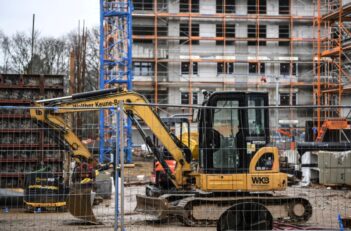
A new rule prohibits evicting survivors of domestic violence for reporting their abuse.
Lakisha Briggs faced an impossible choice when her abusive ex-boyfriend—just released from prison—showed up on her doorstep. Briggs reportedly feared for her family’s safety, but simultaneously feared eviction for contributing to a “nuisance” if she let the altercation at her front door continue. Days later, her abuser stabbed her in the neck, sending Briggs to the emergency room.
A December rule from the U.S. Department of Housing and Urban Development (HUD) includes several policy changes to help ensure that other survivors of domestic violence need not choose between abuse and eviction, as Briggs reportedly felt forced to do. In a housing discrimination complaint filed on Briggs’ behalf, HUD explained the harm that so-called nuisance property ordinances cause. HUD alleged that Briggs was treated unlawfully because her town’s nuisance property ordinance “encourages landlords, at the risk of being fined, to evict tenant[s]…for ‘disorderly behavior,’ including domestic violence.” The new rule’s emergency transfer plan attempts to address the problems created by nuisance property ordinances and ensures that other survivors of domestic violence do not risk homelessness by calling the police.
When announcing the rule, then-HUD Secretary Julián Castro said that “[n]obody should have to choose between an unsafe home and no home at all” and described the rule as “a necessary step toward ensuring domestic violence survivors are protected from being twice victimized when it comes to finding and keeping a home they can feel safe in.”
Housing officials issued the rule in response to a provision of the Violence Against Women Reauthorization Act of 2013 that required HUD to create an emergency transfer plan that would allow people living in HUD-funded housing to move to another assisted housing unit if they experience domestic violence, sexual assault, or stalking. The rule also provides that survivors cannot be denied housing assistance in HUD programs because they have experienced domestic violence.
The American Civil Liberties Union (ACLU), a leading non-profit devoted to defending civil liberties, has long advocated for HUD action in this arena. In a 2013 comment letter, ACLU officials argued that HUD action was necessary to safeguard women endangered by nuisance property ordinances. The ACLU explained that women “make up the vast majority of domestic violence victims and…may need to reach out to police repeatedly due to the conduct of their abusers.” The ACLU said that HUD officials needed to conform the federal housing projects it funds to meet the requirements of the Violence Against Women Reauthorization Act.
A study on nuisance property ordinances conducted by the Sargent Shriver National Center on Poverty Law found that such laws typically require landlords to evict the entire household in response to a criminal allegation, meaning that victims often complain at their peril. As the study notes, landlords often evict disruptive households preemptively; to avoid the possibility of being fined, landlords may remove families from their property even if a local ordinance does not require them to do so.
Another study—conducted by Matthew Desmond of Harvard University and Nicol Valdez of Columbia University—reinforced the impact of nuisance ordnances on domestic violence survivors. Desmond and Valdez found that, over a two-year period in Milwaukee, almost one-third of the nuisance citations stemmed from instances of domestic violence and that officials disproportionately issued such citations in predominantly black neighborhoods. Only four of the 59 cities surveyed have ordinances that include a provision to protect domestic violence survivors from eviction as a consequence of the abuse they have endured.
In response to these challenges, the HUD rule allows survivors of domestic violence to self-certify abuse they have endured, rather than requiring documentation from another individual such as a doctor or social service worker. Furthermore, the rule grants survivors a voice in determining where they will move to ensure that they feel safe in their new home. The new regulations also establish mandatory procedures for housing providers if no units are available for domestic violence survivors immediately when needed. The housing provider must refer the survivor to a domestic violence shelter or other emergency services organization until settling on a transfer plan and document the eventual outcome of the transfer request. Housing providers must report all emergency requests and outcomes to HUD annually.
The Council of Large Public Housing Authorities, a non-profit dedicated to affordable housing, expressed concerns about imposing rigid procedures on housing providers for processing emergency transfer requests. Council representatives pointed out that many housing providers operate with waiting lists that would be disrupted by accommodating the new requests. The non-profit’s representatives commented that housing providers should be permitted to provide emergency transfer plans in whatever fashion they see fit.
Finally, HUD’s rule also addresses the housing barriers that survivors of domestic violence face when their abusers damage their property or negatively affect their credit by taking out credit cards in their names. The rule prohibits housing providers from turning away survivors based solely on these collateral effects of domestic and sexual violence.
The rule took effect on December 16, 2016.



